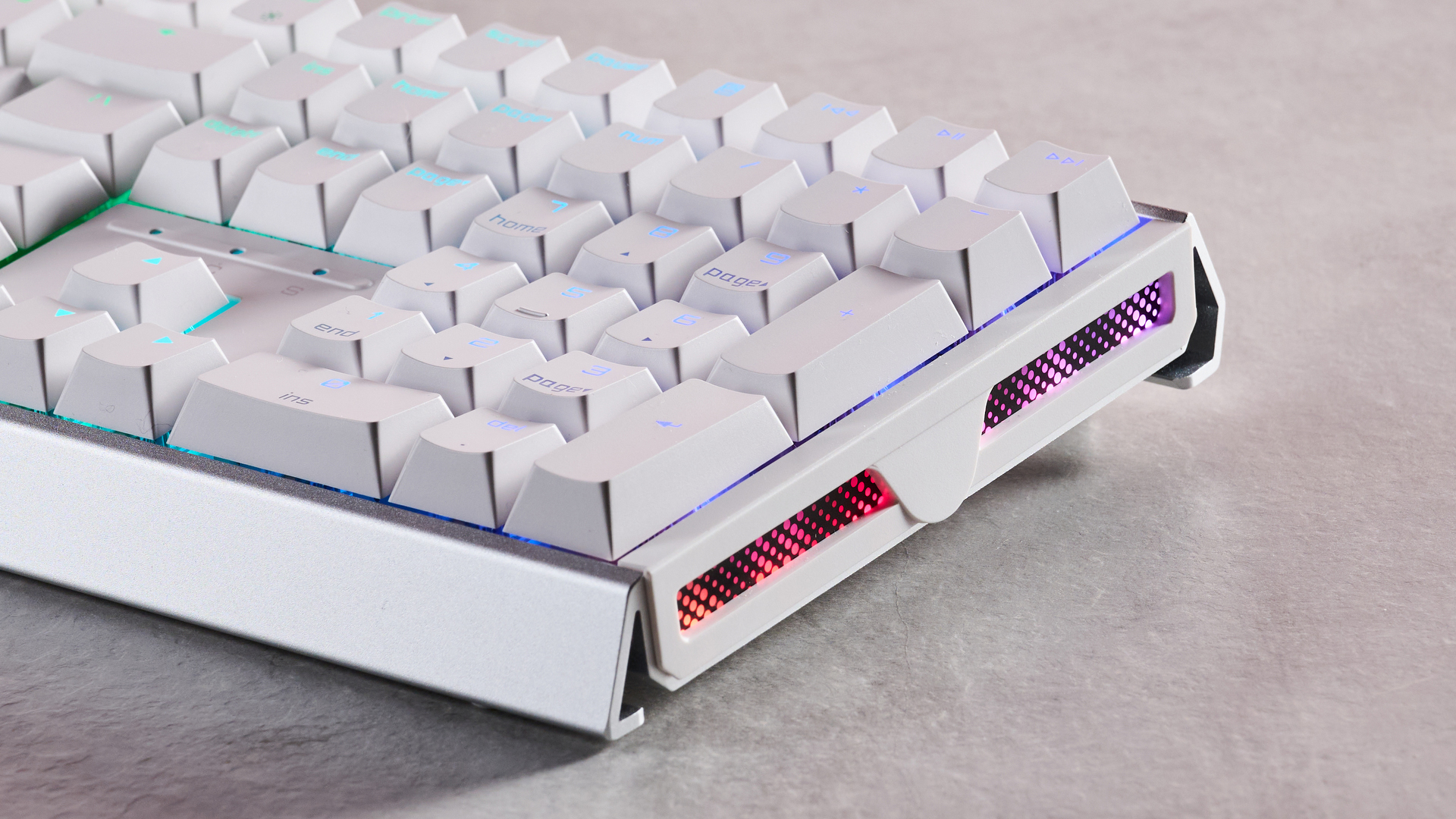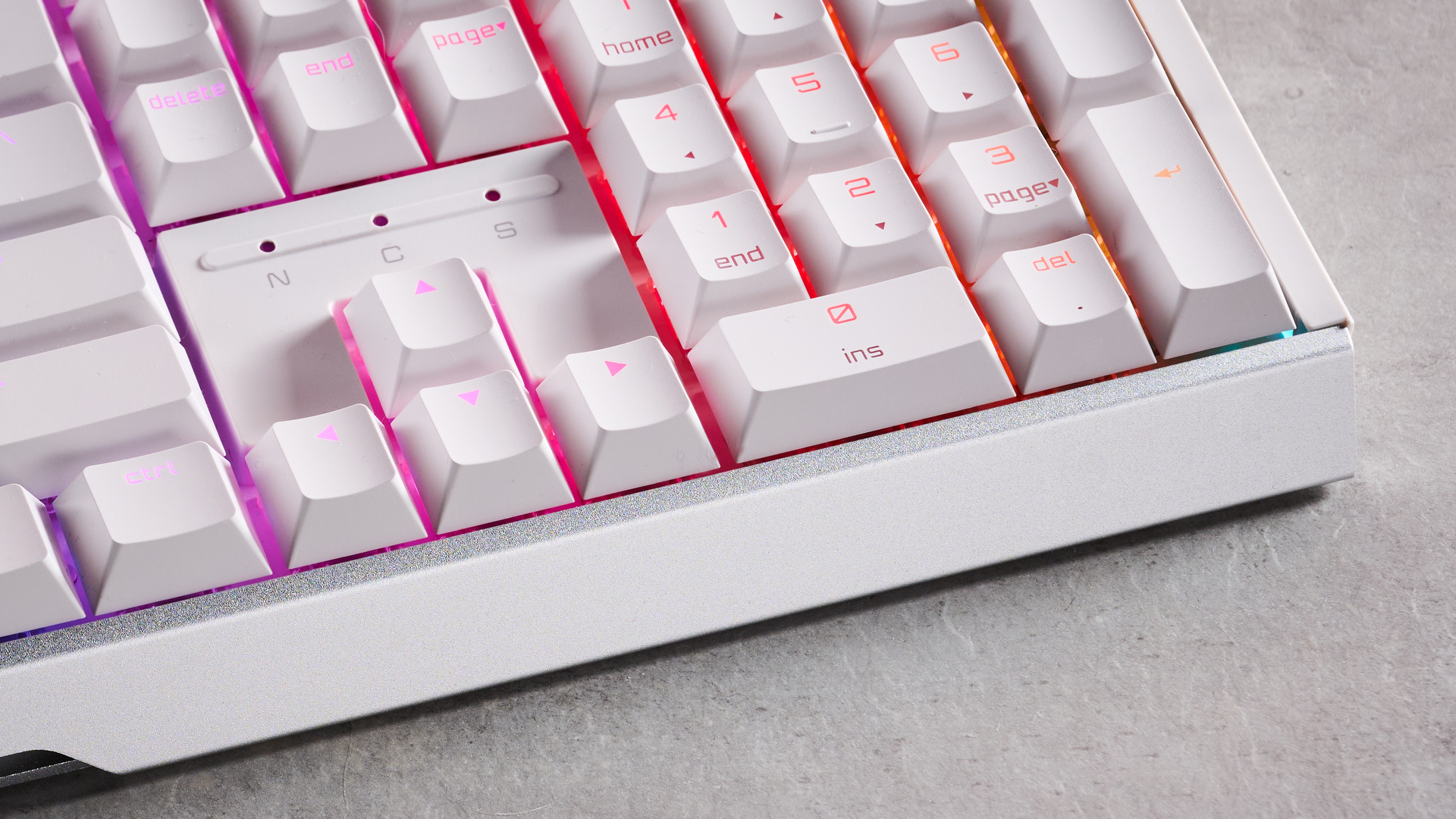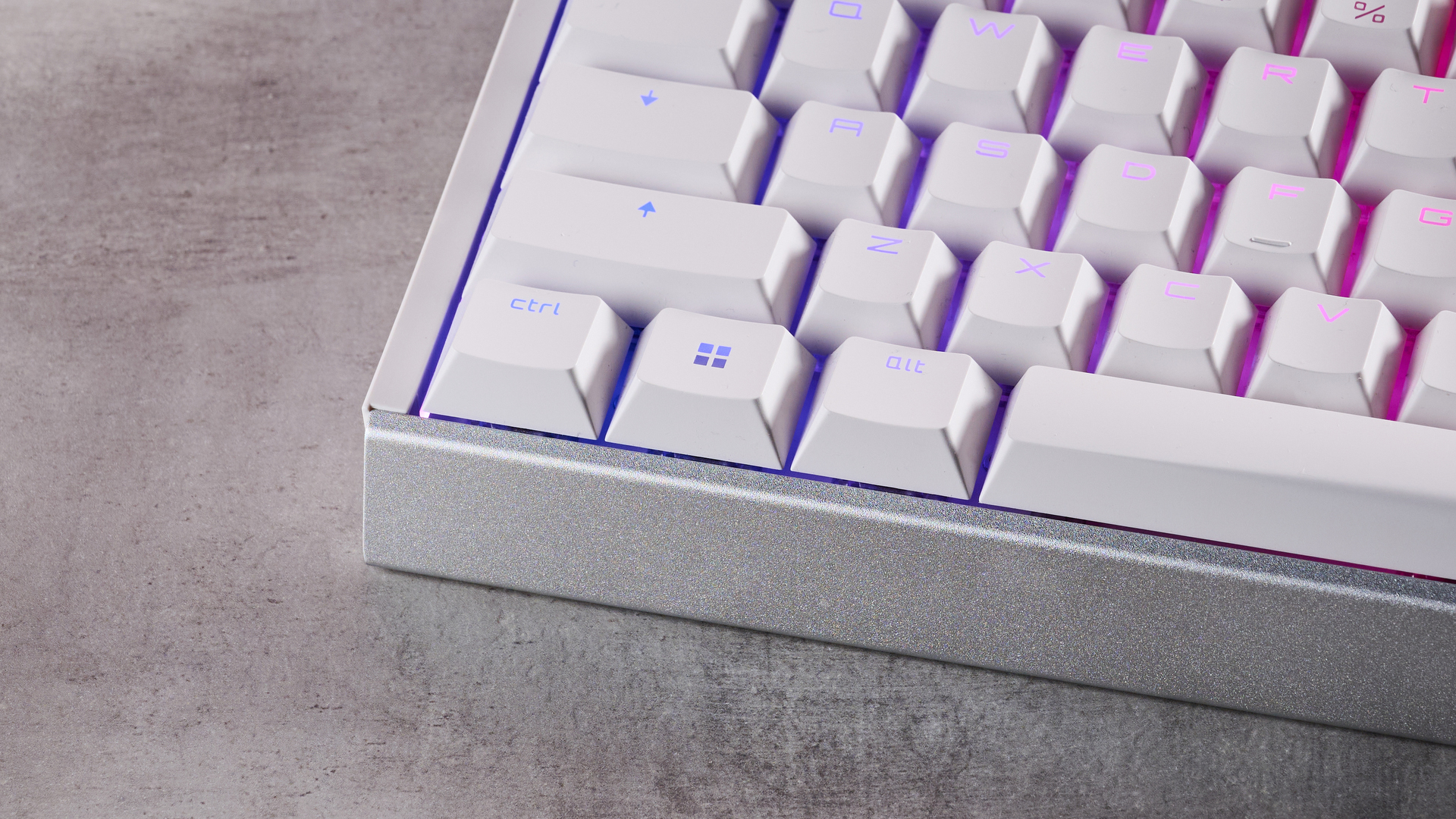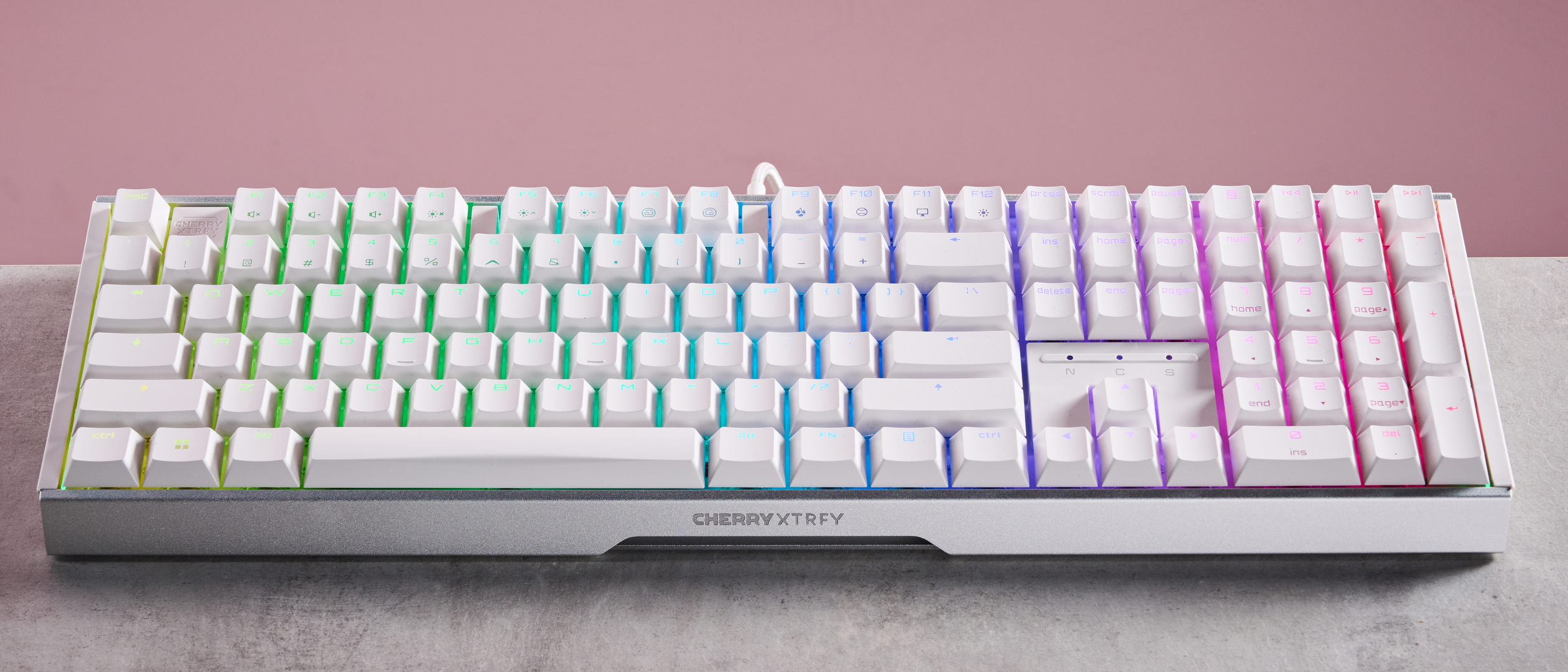TechRadar Verdict
The Cherry XTRFY MX 3.1 is a well-made mechanical gaming keyboard that offers decent performance, but it doesn’t quite live up to its promise. It doesn't feel as tactile as a mechanical keyboard should, and the lack of features means it fails to stand out in a crowded market, where you’ll find plenty of better value propositions.
Pros
- +
Satisfying performance
- +
Compact for a full-size board
- +
Sturdy construction
Cons
- -
Limited software
- -
Relatively heavy switches
- -
No foldable feet
Why you can trust TechRadar
Cherry XTRFY MX 3.1: one-minute review
The Cherry XTRFY MX 3.1 is a wired mechanical keyboard with the simple aim of delivering great gaming performance.
Its sleek appearance is achieved thanks to the low profile keycaps with their prominent indentations, and despite being made from ABS, they look and feel every bit as premium as their PBT counterparts.
What’s more, the very bright RGB lighting looks particularly striking on the white colorway. The metal chassis, however, looks less impressive, coming across a little cheap.
Fortunately, it feels more solid than it appears – as does the whole board for that matter, equaling what the best gaming keyboards have to offer. It’s reasonably heavy as a result, but not onerously so.
The detachable USB cable also feels premium. It’s braided which makes it more flexible, and it’s quite long, too, which makes it easier to route on various setups.
The software that attends the MX 3.1 is quite limited compared to those of other gaming keyboards, containing only a handful of shortcuts rebind options and a basic macro facility – and not much else besides. This will no doubt disappoint gamers after deep customization options.
To game with, the MX2A switches in the MX 3.1 are heavier than you might expect. They feel quite clicky with minimal dampening, which can make them feel a little harsh when hammering away at them.
Sign up for breaking news, reviews, opinion, top tech deals, and more.
This aspect isn’t helped by the short travel of the keys. Thankfully, those indentations on the keycaps are comfortable and secure, which makes them ideal for both gaming and typing.
I also appreciated the rounded back edge of the space bar, which softens the impact when you hit it. This is especially useful given the shallow angle of the layout: instead of fold-out feet, the MX 3.1 comes with two sets of screw-in pins with different heights. No matter which set I installed, the layout always seemed too flat for my liking. Combined with the thick body, this means the MX 3.1 can get uncomfortable after long sessions.
It’s priced slightly below what you might expect from a wired mechanical gaming keyboard, but in today’s market there are plenty of great value models offering more features and stronger performance for less.

Cherry XTRFY MX 3.1 review: price and availability
- $129 (about £100 / AU$200)
- Available now in three colorways
- Slight below-average pricing
The MX 3.1 costs $129 (about £100 / AU$200) and is available now in black, white, and pink colorways, although the latter is currently only available in Asia.
This is a slightly-below average price for a full-size wired mechanical keyboard, but there are plenty of wired and even wireless alternatives that perform just as well, if not better, for less money.
Take the Roccat Magma, for instance, which is our pick as the best gaming keyboard for those on a budget. It may feature membrane rather than mechanical switches and exhibit less-than-stellar build quality, but its performance is sharp and accurate and has a miniscule price tag in comparison to the MX 3.1.
Even the wireless MonsGeek Fun60 Ultra is cheaper than the MX 3.1, albeit not by as much. This board supports both 2.4GHz and Bluetooth connections, and features TMR analog switches that allow for far greater customization. I also found it great to both game and type on.
Value: 3 / 5
Cherry XTRFY MX 3.1 review: specs
Layout | Full size |
Switch | Mechanical |
Programmable keys | Yes |
Dimensions | 17.1 x 5.4 x 1.4 inches (435 x 138 x 35mm) |
RGB or backlighting | Yes (customizable) |

Cherry XTRFY MX 3.1 review: design and features
- Solid and sturdy construction
- No folding feet
- Limited software
The MX 3.1 has a simple yet sleek design. The speckled metal chassis that frames the entire board features angular contours and sporadic holes, all of which add some interest. However, this frame ultimately looks a little cheap and harks back to a bygone era of gaudy gaming peripherals.
The very bright and vibrant RGB lighting, on the other hand, is striking yet tasteful. It certainly attracts plenty of attention, especially on the white model, which it complements rather well.
Build quality is very good as well, with the whole unit feeling quite sturdy and heavy, more so than perhaps it looks. That metal chassis is solid as you could wish for, and so too are the plastics, which means the MX 3.1 should stand the test of time.
The keycaps look elegant thanks to their low profile and deep indentations. Despite being made from ABS, they feel every bit as premium as PBT varieties. They feel super smoother under the finger tips, too.

Their overall size is quite small compared to those on other mechanical keyboards, which makes the whole of the MX 3.1 feel more compact. It’s a shame, however, that there’s no volume dial, with F-row shortcuts relied on for this function in its place.
Instead of foldable feet, the MX 3.1 comes with two sets of pins of different lengths that screw into the back end of the board to adjust the angle. While this method arguably offers a more secure footing, it’s a less sophisticated and more time-consuming solution.
What’s more, even the longer pins aren’t tall enough to create an angle I was entirely comfortable with. This issue is exacerbated by the thick chassis – and lack of wrist support – which meant my wrists had to bend upwards more than I would’ve liked.
The MX 3.1 comes with a long, braided USB cable, which makes it amenable to various setups and routing options. The central placement of the USB-C port also helps with these aspects.
The companion software for the MX 3.1, the Cherry Utility Software, is quite sparse compared to rival tools. Every key can be remapped to another, but there are only a handful of system and media shortcuts available to assign, while the macro creator is very basic. Those looking for more performance based tweaks will be disappointed.
Design & features: 3.5 / 5
Cherry XTRFY MX 3.1 review: performance
- Switches heavier than expected
- Good for typing
- Considerate space bar design
The MX2A Silent Red linear switches are quite clicky with little dampening, which makes them feel harsh when hit hard. They’re also quite heavy to press, which is most noticeable when using the WASD keys for in-game movement. This resistance is somewhat surprising, given the short travel of the keys themselves.
This short travel makes the MX 3.1 great for typing on, though, as do the aforementioned keycap indentations, since they provide both security and feedback when touch typing. Their low profile also helps to compensate for the whole unit’s lack of tilt, allowing my fingers to stay relatively flat while dancing around the keys, which I find more comfortable.
Another aspect of the MX 3.1 I appreciated is the soft curve on the back edge of the space bar, as this cushions impacts with the thumb. It’s a shame this curve is confined to the center rather than extending along the entire edge, but I still appreciated its inclusion.

Performance: 3.5 / 5
Should I buy the Cherry XTRFY MX 3.1?
Attributes | Notes | Rating |
|---|---|---|
Value | It costs less than the average price for a mechanical keyboard, but there are cheaper alternatives with more features. | 3 / 5 |
Design and features | The MX 3.1 is elegant, despite the somewhat dated design of the metal frame. It’s built to a surprisingly high standard, too, although the software is underwhelming. | 3.5 / 5 |
Performance | The switches are heavier than you might expect, but typing is satisfying. The lack of angle can cause some ergonomic issues. | 3.5 / 5 |
Overall | The MX 3.1 doesn’t do anything to set the gaming keyboard world alight. While it’s solid in some regards, it’s too expensive for what it offers. | 3.5 / 5 |
Buy it if…
You want a solid build
The metal chassis and plastics are strong. The keycaps feel premium, too, more so than their ABS material might suggest.
You want great keycaps
Despite their ABS construction, the keycaps feel great, with their low profile and indentations making for easy typing.
Don’t buy it if…
You want to tinker
The companion software for the MX 3.1 is very limited relative to what some other manufacturers offer.
You want to save money
The MX 3.1 is reasonable compared to other wired mechanical keyboards, but there are many alternatives that represent better value.
Cherry XTRFY MX 3.1 review: also consider
| Header Cell - Column 0 | Cherry XTRFY MX 3.1 | MonsGeek FUN60 Ultra | Roccat Magma |
|---|---|---|---|
Layout | Full size | 60% | Full size |
Switch | Mechanical | Analog (TMR magnetic) | Membrane |
Programmable keys | Yes | Yes | Yes |
Dimensions | 17.1 x 5.4 x 1.4 inches (435 x 138 x 35mm) | 11.5 x 4 x 1.1 inches (293 x 102.5 x 28.5mm) | 17.8 x 6.2 x 1.5 inches (452 x 157 x 39mm) |
RGB or backlighting | Yes (customizable) | Yes (customizable) | Yes (customizable) |
Roccat Magma
The Roccat Magma is much cheaper than the MX 3.1, and while the build quality isn’t the strongest, we found its performance worthy of a gaming keyboard. For those just starting out, it’s a good choice since you won’t be spending untold amounts to get one. Read our full Roccat Magma review.
MonsGeek FUN60 Ultra
It might not be hugely cheaper than the MX 3.1, but the FUN60 Ultra is better value. It has two wireless modes, TMR analog switches with heaps of customizations, and satisfying gaming performance. It’s also built to a high standard. Read our full MonsGeek FUN60 Ultra review.
How I tested the Cherry XTRFY MX 3.1
- Tested for a week
- Used for gaming and working
- Extensive gaming keyboard experience
I tested the MX 3.1 for about a week, during which time I used it for gaming and working.
I played Counter-strike 2, which is a great test for keyboards given the demands it places on fast and its requirement of precise inputs. I also played games that make greater use of the entire layout, such as Abiotic Factor.
I’ve been PC gaming for over a decade, and during that time I’ve experienced a vast array of gaming keyboards. I’ve also tested a wide range of them, as well as other Cherry XTRFY products.
- First reviewed: August 2025
- Read more about how we test

Lewis Maddison is a Reviews Writer for TechRadar. He previously worked as a Staff Writer for our business section, TechRadar Pro, where he gained experience with productivity-enhancing hardware, ranging from keyboards to standing desks. His area of expertise lies in computer peripherals and audio hardware, having spent over a decade exploring the murky depths of both PC building and music production. He also revels in picking up on the finest details and niggles that ultimately make a big difference to the user experience.
You must confirm your public display name before commenting
Please logout and then login again, you will then be prompted to enter your display name.
